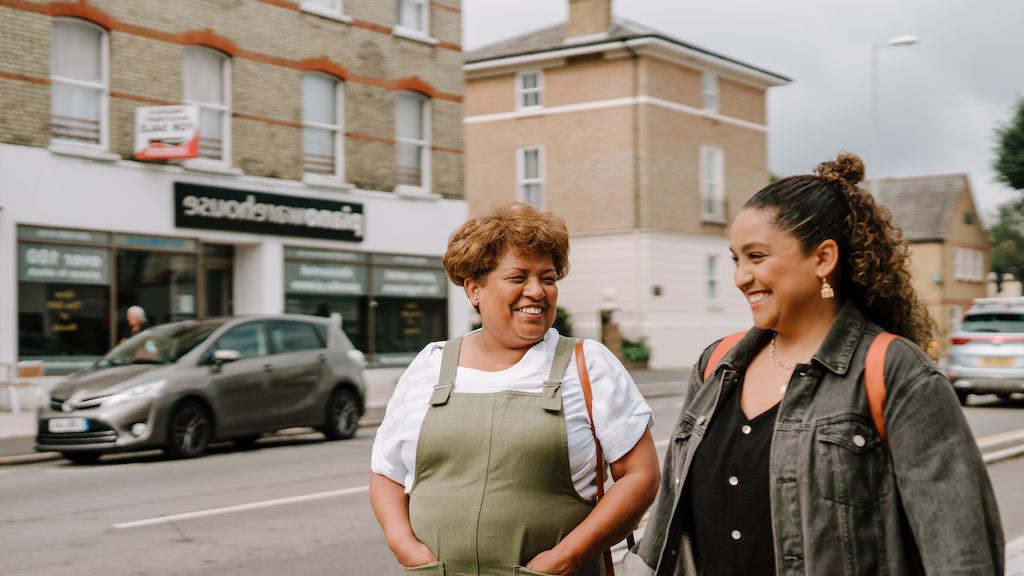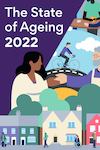Summary | The State of Ageing 2022
Our annual State of Ageing report suggests that England is becoming an increasingly challenging country to grow old in, with rising pensioner poverty and poor health.

The State of Ageing in England is getting worse
Today there are almost 11 million people aged 65 and over - 19% of the total population. In 10 years’ time, this will have increased to almost 13 million people or 22% of the population.
As our comprehensive review of national data on ageing makes clear, a financially secure and healthy later life is becoming increasingly unlikely for millions of people.
And, with the population ageing rapidly, the number of people at risk is growing at an alarming rate. The latest data shows a sharp increase in pensioner poverty, meaning that almost 1 in 5 people were living in poverty in the 2019/20 period. That's some 2 million people.
We have also seen a reduction in our life expectancy (of 0.3 years for women and 0.4 years for men). Meanwhile, the number of years we can expect to spend in good health, without a disabling illness, continues to decline; this is now 62.4 years for men and 60.9 years for women.
In a period when the state pension age has risen to 66, employment rates among people approaching retirement age have fallen to their lowest levels since 2016.
The number of older people renting rather than owning their homes has reached an all-time high.
These factors have major implications for people’s financial security and for the quality of their homes as they age. The number of people in mid and later life who live alone – many without the traditional family structures our approach to ageing has historically relied on – has been increasing steadily, with 1.3 million men aged 65 and over living alone today, up 67% between 2000 and 2019.
This has implications for housing and for health and social care. These trends confirm that England is becoming a more challenging country to grow old in. We can see in our data that the pandemic has, of course, contributed to many of these problems – but they are ultimately longer term issues that have been developing for some time. And they will not go away as we return to life as it was before COVID without concerted action.
It is widely known that our chances of having a decent old age vary, and the data we have amassed confirms that the people who are least well-off have the slimmest chance of all.
Across England today – depending on where we live and how well-off we are – there are differences of up to ten years in how long we can expect to live and more than 17 years in the time we get in good health without a disabling illness.
Almost 1 in 5 homes headed by someone aged 60 or older is in a condition that endangers the health of the people who live there. In fact, almost 9,000 people died in England and Wales last year because their homes were too cold.
The UK state pension is one of the worst in Europe providing just 58% of previous earnings from work - below the OECD average of 62%. Those people who have to rely on the pension as a main or only source of income face a bleak financial future.
All this data demonstrates vividly that we cannot afford to be complacent about ageing and about our collective futures, and particularly the futures of people experiencing poverty, discrimination, and other disadvantages accumulated over the course of their lifetimes.
The State of Ageing 2022 has five chapters: Health, Homes, Work, Communities and a chapter setting out the context in which we are ageing. It looks at data from a wide range of sources such as the English Housing Survey, the GP Patient survey, the Health Survey for England and the Community Life Survey, as well as a host of official statistics from the Office for National Statistics (ONS) and government sources such as the Office for Health Improvement and Disparities and the Department for Work and Pensions.
Ultimately it shows that the experience of being older in England is getting considerably worse for many. The data we have looked at demonstrates the huge challenges facing the government’s levelling up ambitions to reduce inequalities across England as well as its stated commitment to increase healthy life expectancy by five years.
While we make recommendations for action under each chapter, our overall recommendation is that government appoints an Older People’s Commissioner for England to protect and promote the rights of older people and to help make England a better place to grow old in. In line with the existing Older People’s Commissioners in Wales and Northern Ireland, this role would champion the needs of older people, particularly those at greatest risk, and safeguard all our journeys into later life.
Sharp rise in pensioner poverty
Almost 1 in 5 people of pension age were living in relative poverty in 2019/20, following a sharp increase (of 200,000 people) over the previous year. This extends a worrying trend which first emerged in the middle of the last decade and means more than 2 million people of state pension age in the UK were living in poverty in 2019/20.
It comes after a long period of widening wealth and income inequalities among people in their 50s and 60s. The net (non-pension) wealth of the richest 20% of people in this age group doubled between 2002 and 2018, while that of the poorest 20% fell by 30%. And with declining home ownership, this age group will face even larger financial challenges in retirement.
The pandemic has reversed progress on the employment of older people
Last year, we warned that challenges around employment already faced by older workers could – if exacerbated by the pandemic – push many out of the workforce for good, years before they reach state pension age.
This has now come to pass: the number of people aged 50 to 64 who are not engaged with the labour market in any way (that is, they are neither working nor looking for work) has risen by 228,000 since the start of the pandemic, and the employment rate in this group has fallen by 1.8 percentage points.
After decades of narrowing, the employment rate gap between older and younger workers is now wider than it was two years ago. These trends are entirely at odds with the government’s ambitions to extend working lives, raise the state pension age, boost productivity and level-up the UK.
But they reflect the reality for many individuals who feel shut out, undervalued, and financially disadvantaged by an ageist labour market. We now need to see the same levels of energy that have been directed towards staving off a spike in youth unemployment focused on programmes which will pull these lost workers back into the labour market.
And employers struggling to recruit should look to the principles of age-friendly employment to recruit and retain this valuable workforce.
The number of older private renters is at an all-time high
This trend towards an increase in both the number and proportion of older renters is set to continue, as rates of home ownership among younger age groups continue to fall.
Rising levels of private renting have major implications for financial insecurity among older people. The oldest renters – those aged 75 and over, spend almost half of their incomes on rent. Retirement, and the years leading up to it, can no longer be assumed to be a time of falling living costs.
Private rentals are also the most likely to fail the government’s own standard of a ‘decent home’, almost a quarter of such homes are non-decent. There is a strong association between the condition of our homes and our health, with cold and damp causing and exacerbating conditions such as respiratory and cardiovascular disease.
So rising levels of private renting have serious implications not just for the finances of their older residents but for their health and safety too.
The number of years people can expect to spend without a disabling health condition is falling
Disability-free life expectancy –the number of years on average people can expect to live without a disabling health condition – has continued its dramatic fall, particularly among women. And there is shocking inequality in how much of our lives we will live with illness and disability.
At birth, people in the most deprived areas can expect to live more than 17 years more with disabling health conditions than those in the least deprived areas. Living with a disability would not have to be a hardship if the world were structured with different access needs in mind. But it isn’t.
As an example, fewer than one in ten homes in England have the accessibility features that would make it easy for someone with a disability to live there. And these trends tell us that the way our society is set up is increasingly damaging to our health.
What needs to happen
- A cross-departmental strategy is needed to coordinate government activity and funding to address the ageing population and level up the dramatic and growing inequality in the way we experience later life.
- Society needs a stronger voice to hold the government to account and to counter the ageism that is at the heart of many issues faced by as they grow older. An Older People’s Commissioner for England with statutory powers to protect and champion older people and the needs of our ageing society must be enshrined in law as has been done already in Wales and Northern Ireland.
- The collection of national data needs to expand and become sufficiently robust so the experiences of different groups can be more clearly understood, and ethnicity data reporting must be mandatory in all official and statutory statistics and data monitoring. The near invisibility of older people from Black, Asian and Minority Ethnic groups in the data currently means we cannot fully understand the systemic discrimination that we know is faced by people from ethnic minority backgrounds, nor ensure that policies and practices are designed to level up and support people experiencing the greatest inequalities.
Each chapter also includes detailed recommendations on delivering the following changes:
Health:
- Concerted action from across government to reverse trends in stalling life expectancy and increasing amounts of time spent living with illness and disability.
- Co-ordinated action from across government to address stark and growing health inequalities.
Housing:
- Focused action from across government to tackle the national crisis that is our poor-quality housing stock.
- Introducing regulations to ensure that all new homes are fit for the future.
Work:
- Targeted, individualised back-to-work support for over 50s to address the particular challenges this group faces in the labour market, including ageism.
- The creation of workplaces that support longer working lives.
Communities:
- The creation of communities that enable older people to be active, participate in and shape the places in which they live.
- Recognition of and support for the role that community services and the voluntary sector play in health and wellbeing of people as they grow older.
